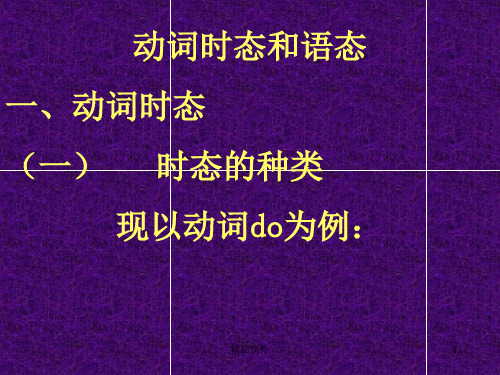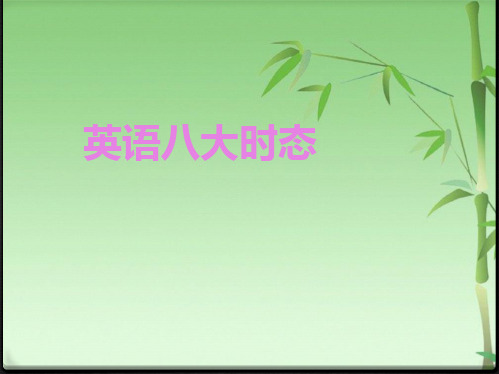- 1、下载文档前请自行甄别文档内容的完整性,平台不提供额外的编辑、内容补充、找答案等附加服务。
- 2、"仅部分预览"的文档,不可在线预览部分如存在完整性等问题,可反馈申请退款(可完整预览的文档不适用该条件!)。
- 3、如文档侵犯您的权益,请联系客服反馈,我们会尽快为您处理(人工客服工作时间:9:00-18:30)。
Tense)是表示行为、动作和状态在各种 时间条件下的动词形式。
一般式 进行式 完成式 完成进行 式
现在 一般现在 现在进行 现在完成 现在完成 进行
过去 一般过去 过去进行 过去完成 将来 一般将来 将来进行 将来完成
过去将来
1
He loves me. He loved me. I will love him forever. I have loved him for 6 years. I told him I had loved him for 5 years last year. I will have loved him for 7 years by the end of this year. I asked him if he would love me forever.
Oh, it’s you! You’re so beautiful that I didn’t recognize you. (说话时已经知道,只是“刚才”没认 出。)
16
2) 表示过去经常或反复发生的动作。 He used to smoke. I talked to him many times, but he just didn’t listen.
12
be going to +v在口语中广泛使用 你明天打算干什么? What are you going to do tomorrow? 看这黑云,有一场暴风雨了. Look at the dark clouds, there is going to be a storm.
13
be about to +v表示马上发生的事情,时间 上是不明确的。例如: He was about to start. He is about to leave for Beijing. 注意:be about to 不能与tomorrow, next week 等明确的时间状语连用。
8
3.某些动词的进行式与 always, often, forever(常常), constantly(经常地)连用时,表 示赞叹、赞扬、抱怨、生气、不耐烦。
他经常制造麻烦. He is always making trouble. 他经常帮助别人. He is always helping others.
一般将来时 will / shall(第一人称I) do
表示将来发生的动作或状态,常与表示 将来的时间状语连用,如:tomorrow, next week, in a few days, next Sunday I shall/will graduate next year. He will be back in a few days.
10
D. 思考理解 understand,know,believe,doubt(怀疑), forget,remember E. 占有与从属 have,possess(拥有),own (拥有) , include, consist(包括,组成), contain(包 含),belong (属于)
11
2
一般现在时
经常发生或反复发生的动作 She visits her parents every day. He smokes a lot. 常与表习惯的副词 always, time,
now and then(偶尔), occasionally(偶 尔), often, seldom(极少), sometimes, usually等连用。
6
现在进行时 be+ving 1 表示正在进行的动作或现阶段在持 续进行未完成的动作 He is talking in class. I am reading papers right now. She is writing a report these days.
7
2 表示将来动作(有意图,打算之意, 用于go, come, stay, leave, start, arrive,return等动词) Mike is taking an evening flight back. They’re leaving next week.
5
少数动词(be, go, come, start, depart, arrive, begin, leave等),用一 般现在时表示按规定、计划或安排要求 发生的动作。 The meeting begins at ten tomorrow morning. 下一班火车七点钟出发. The next train leaves at 7:10.
3
现在的情况或状态 I know you are busy. He lives in a small town. 永恒的真理 The moon goes round the earth. Summer follows spring.
4
在时间,条件状语从句中表示将来的动作。 We will visit the factory __if_i_t_i_s_f_i_ne__t_o_m_o_rr_o_w.(如果明天天气好) I’ll tell him about this __w_h_e_n_h_e__c_om__es___.(当他来的时候)
14
一般过去时 1) 表示过去某个时间发生的动作或情
况。常与表示过去的时间状语连用, 如: He was here just now.(刚才) I went to the cinema last night.
15
When we arrived there, they gave us a warm welcome.
9
4 英语里一些动词不用于现在进行时: A. 知觉(感光动词) See, hear, smell, taste, notice, feel B 态度和情感 Believe, agree, like, hate, want, think, love, fear, wish C. 表存在状态 Have, be,exist(存在),remain,stay





